Planning and course
计划与愿望英语作文
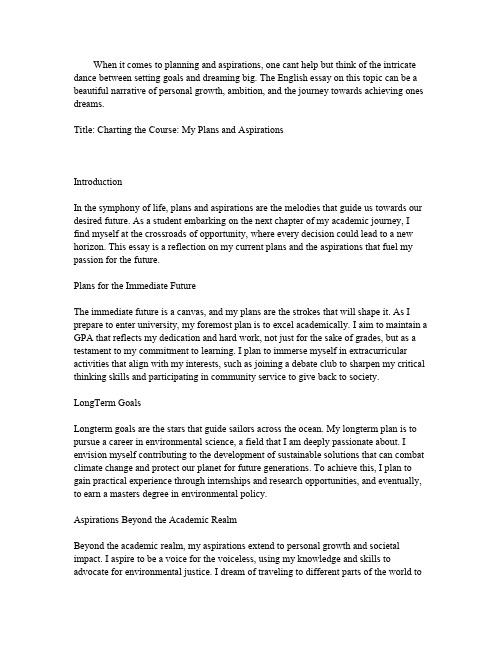
When it comes to planning and aspirations,one cant help but think of the intricate dance between setting goals and dreaming big.The English essay on this topic can be a beautiful narrative of personal growth,ambition,and the journey towards achieving ones dreams.Title:Charting the Course:My Plans and AspirationsIntroductionIn the symphony of life,plans and aspirations are the melodies that guide us towards our desired future.As a student embarking on the next chapter of my academic journey,I find myself at the crossroads of opportunity,where every decision could lead to a new horizon.This essay is a reflection on my current plans and the aspirations that fuel my passion for the future.Plans for the Immediate FutureThe immediate future is a canvas,and my plans are the strokes that will shape it.As I prepare to enter university,my foremost plan is to excel academically.I aim to maintain a GPA that reflects my dedication and hard work,not just for the sake of grades,but as a testament to my commitment to learning.I plan to immerse myself in extracurricular activities that align with my interests,such as joining a debate club to sharpen my critical thinking skills and participating in community service to give back to society.LongTerm GoalsLongterm goals are the stars that guide sailors across the ocean.My longterm plan is to pursue a career in environmental science,a field that I am deeply passionate about.I envision myself contributing to the development of sustainable solutions that can combat climate change and protect our planet for future generations.To achieve this,I plan to gain practical experience through internships and research opportunities,and eventually, to earn a masters degree in environmental policy.Aspirations Beyond the Academic RealmBeyond the academic realm,my aspirations extend to personal growth and societal impact.I aspire to be a voice for the voiceless,using my knowledge and skills to advocate for environmental justice.I dream of traveling to different parts of the world tounderstand diverse perspectives on environmental issues and to learn from the wisdom of indigenous communities.Moreover,I aspire to inspire others to take action,to ignite a spark of curiosity and passion in those around me.Overcoming ChallengesThe path to achieving my plans and aspirations is not without its challenges.I anticipate the need to balance academic rigor with personal wellbeing,to navigate the complexities of a globalized world,and to confront the everevolving nature of environmental issues. However,I am prepared to face these challenges headon,with resilience and determination.I believe that every obstacle is an opportunity for growth and that every failure is a stepping stone towards success.ConclusionIn conclusion,my plans and aspirations are the compass that guides my journey.They are not just dreams but a roadmap to a future where I can make a difference.As I chart my course,I carry with me the wisdom of the past,the courage of the present,and the hope for a brighter tomorrow.It is with this mindset that I step forward,ready to embrace the adventures that lie ahead.This essay is a personal testament to the power of planning and dreaming.It is a reminder that with clear goals and a steadfast vision,one can navigate the complexities of life and chart a course towards a fulfilling future.。
辅导员kpi绩效考核指标

辅导员kpi绩效考核指标英文回答:Key Performance Indicators (KPIs) for Academic Advisors. Student Success and Retention:Graduation rates.Retention rates.Student satisfaction.Course Planning and Advising:Number of students advised.Course registration accuracy.Student academic planning.Collaboration and Communication:Collaboration with faculty and staff.Communication with students and parents.Involvement in campus activities.Professional Development and Growth:Continuing education and professional development. Contribution to the advising profession.Leadership and mentorship.Other:Number of advising hours.Student caseload.Special projects or initiatives.中文回答:辅导员kpi绩效考核指标。
学生成功与保留率:毕业率。
保留率。
学生满意度。
课程规划与咨询:咨询的学生人数。
课程注册准确性。
学生学业规划。
合作与沟通:与教职工合作。
与学生和家长沟通。
参与校园活动。
专业发展与成长:继续教育和专业发展。
对咨询专业的贡献。
领导力和指导。
其他:咨询时数。
学生量。
特殊项目或倡议。
Instructional Design, Course Planning and Developing the Syllabus 教学设计,课程规划和发展课程
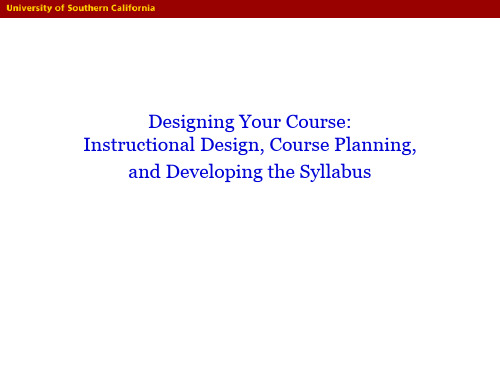
At the end of this workshop, instructors should be prepared to produce a syllabus which: • Articulates specific aims and objectives for a course in their field • Identifies the relationship between course objectives, course content, and sequencing of material • Demonstrates how teaching effectiveness is related to student assessment and course objectives • States clearly defined mutual expectations • Is clear, coherent, and comprehensive.
A Useful and Effective Syllabus …
Requires reflection and analysis before instruction begins Provides a plan that conveys the logic and organization of the course; Includes content, process, and product goals Provides students with a way to assess the whole course its rationale, activities, policies, and scheduling Clarifies instructional priorities Defines and discusses the mutual responsibilities for the instructor and the students in successfully meeting course goals Allows students to achieve high degrees of personal control over their learning Is much more than a practical document, it has conceptual and philosophical components Serves as a contract for learning
课程表英语作文45句简单
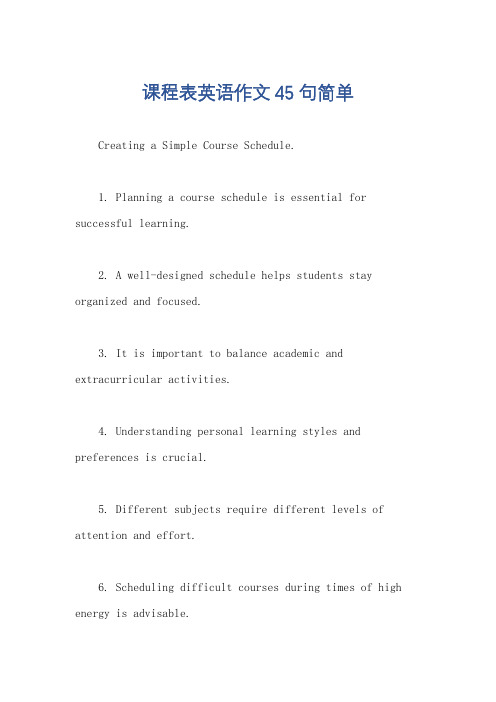
课程表英语作文45句简单Creating a Simple Course Schedule.1. Planning a course schedule is essential for successful learning.2. A well-designed schedule helps students stay organized and focused.3. It is important to balance academic and extracurricular activities.4. Understanding personal learning styles and preferences is crucial.5. Different subjects require different levels of attention and effort.6. Scheduling difficult courses during times of high energy is advisable.7. It is essential to plan enough breaks to avoid overexertion.8. Regular revision and updating of the schedule are necessary.9. Prioritizing courses based on importance and deadline is helpful.10. Using a calendar or planner can make scheduling easier.11. Online tools and applications can assist in creating and managing schedules.12. A balance of theoretical and practical courses is beneficial.13. Scheduling classes at regular intervals improves retention.14. Understanding the course syllabus is key to effective scheduling.15. Allocating enough time for self-study and revision is crucial.16. Mixing easy and difficult courses can help maintain motivation.17. Regular attendance is essential for good performance.18. Scheduling courses according to interest and passion enhances engagement.19. Leaving some flexibility in the schedule allows for unexpected changes.20. Prioritizing courses based on career goals and aspirations is beneficial.21. Scheduling courses with like-minded classmates canfoster collaboration.22. Understanding the course workload is essential for effective planning.23. Using a variety of learning methods improves comprehension.24. Scheduling regular reviews and assessments is helpful.25. Staying organized with a clear schedule reduces stress and anxiety.26. Regular feedback and discussions with teachers are beneficial.27. Scheduling breaks between classes helps in refreshing the mind.28. Staying hydrated and well-rested is crucial for effective learning.29. Prioritizing courses based on personal interests and hobbies is motivating.30. Scheduling courses in a variety of subjects provides a broad perspective.31. Understanding the course prerequisites is essential for smooth progression.32. Staying connected with classmates and teachers enhances the learning experience.33. Scheduling regular revision sessions improves retention.34. Using color-coding or labeling in the schedule can improve organization.35. Prioritizing courses based on difficulty level ensures gradual progress.36. Scheduling courses that complement each other enhances understanding.37. Staying engaged with the course material is crucial for effective learning.38. Regular attendance and participation in class discussions are essential.39. Scheduling courses in a sequential order can help in building knowledge.40. Using a variety of resources and study aids improves learning outcomes.41. Prioritizing courses based on personal career plans and aspirations is beneficial.42. Scheduling regular breaks for physical activities and exercise is healthy.43. Staying connected with the academic communitythrough events and workshops is enriching.44. Regular revision and updating of the course schedule keeps it relevant and useful.45. A well-planned course schedule is the foundation for successful academic journey.。
高中英语教学评一体化教学理念与策略
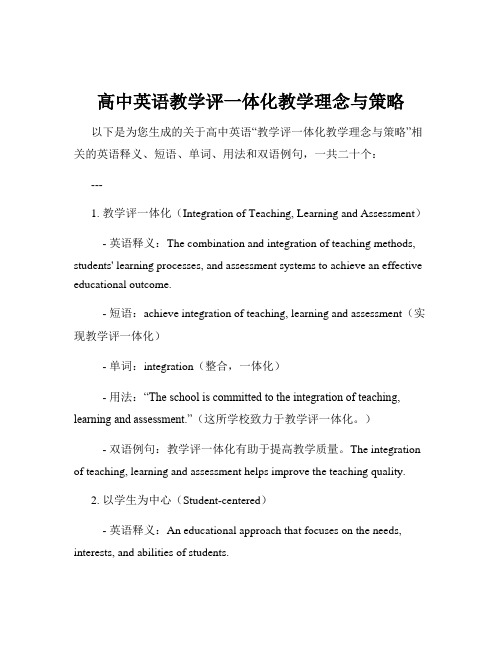
高中英语教学评一体化教学理念与策略以下是为您生成的关于高中英语“教学评一体化教学理念与策略”相关的英语释义、短语、单词、用法和双语例句,一共二十个:---1. 教学评一体化(Integration of Teaching, Learning and Assessment)- 英语释义:The combination and integration of teaching methods, students' learning processes, and assessment systems to achieve an effective educational outcome.- 短语:achieve integration of teaching, learning and assessment(实现教学评一体化)- 单词:integration(整合,一体化)- 用法:“The school is committed to the integration of teaching, learning and assessment.”(这所学校致力于教学评一体化。
) - 双语例句:教学评一体化有助于提高教学质量。
The integration of teaching, learning and assessment helps improve the teaching quality.2. 以学生为中心(Student-centered)- 英语释义:An educational approach that focuses on the needs, interests, and abilities of students.- 短语:student-centered teaching method(以学生为中心的教学方法)- 单词:centered(以...为中心的)- 用法:“We should adopt a student-centered approach in our teach ing.”(我们在教学中应该采用以学生为中心的方法。
计划与安排英语短语
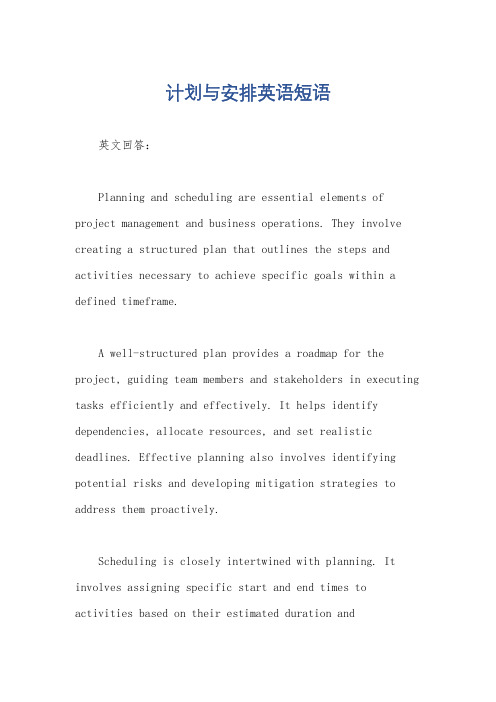
计划与安排英语短语英文回答:Planning and scheduling are essential elements of project management and business operations. They involve creating a structured plan that outlines the steps and activities necessary to achieve specific goals within a defined timeframe.A well-structured plan provides a roadmap for the project, guiding team members and stakeholders in executing tasks efficiently and effectively. It helps identify dependencies, allocate resources, and set realistic deadlines. Effective planning also involves identifying potential risks and developing mitigation strategies to address them proactively.Scheduling is closely intertwined with planning. It involves assigning specific start and end times toactivities based on their estimated duration anddependencies. A comprehensive schedule ensures that tasks are completed in the correct sequence and within the established time frame. It also helps track progress, identify delays, and make necessary adjustments to keep the project on course.Project planning and scheduling tools, such as Gantt charts, PERT diagrams, and critical path analysis, are essential for effective project management. These tools provide a visual representation of the project timeline, allowing stakeholders to understand the interdependencies of tasks and make informed decisions.Effective planning and scheduling can bring several benefits to organizations, including:Improved efficiency: A clear plan and schedule help team members work in a coordinated manner, avoiding duplication of efforts and minimizing waste.Reduced costs: Proper planning can help organizations optimize resource allocation, identifying areas where costscan be reduced.Enhanced decision-making: A well-defined plan provides decision-makers with a clear understanding of the project's goals, timeline, and risks, enabling them to make informed choices.Increased stakeholder engagement: Involving stakeholders in the planning and scheduling process fosters ownership and commitment, leading to better project outcomes.Improved performance: Effective planning and scheduling set clear expectations for team members, ensuring they have the necessary resources and guidance to perform at their best.In summary, planning and scheduling are critical processes that help organizations achieve their goals efficiently and effectively. By creating a structured plan and assigning specific timelines to activities, organizations can optimize resource allocation, improvecommunication, reduce risks, and enhance stakeholder engagement.中文回答:计划与安排。
关于计划的英语作文带翻译
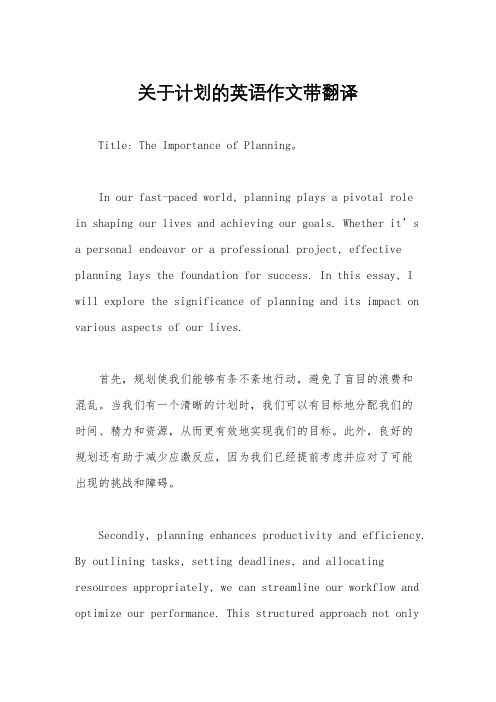
关于计划的英语作文带翻译Title: The Importance of Planning。
In our fast-paced world, planning plays a pivotal rolein shaping our lives and achieving our goals. Whether it’s a personal endeavor or a professional project, effective planning lays the foundation for success. In this essay, I will explore the significance of planning and its impact on various aspects of our lives.首先,规划使我们能够有条不紊地行动,避免了盲目的浪费和混乱。
当我们有一个清晰的计划时,我们可以有目标地分配我们的时间、精力和资源,从而更有效地实现我们的目标。
此外,良好的规划还有助于减少应激反应,因为我们已经提前考虑并应对了可能出现的挑战和障碍。
Secondly, planning enhances productivity and efficiency. By outlining tasks, setting deadlines, and allocating resources appropriately, we can streamline our workflow and optimize our performance. This structured approach not onlyenables us to accomplish more in less time but also minimizes the likelihood of errors and setbacks along the way.Thirdly, planning fosters creativity and innovation. Contrary to the misconception that planning stifles spontaneity, it actually provides a framework within which creative ideas can flourish. When we have a clear roadmap of our objectives, we are better equipped to brainstorm innovative solutions and think outside the box. Moreover, effective planning allows us to anticipate future trends and opportunities, enabling us to stay ahead of the curvein a rapidly evolving world.Furthermore, planning cultivates resilience and adaptability. Despite our best efforts, unforeseen circumstances may arise that derail our plans. However, by incorporating flexibility into our planning process and developing contingency strategies, we can respond to change with agility and resilience. Rather than viewing setbacks as insurmountable obstacles, we can see them as opportunities for growth and learning.In conclusion, planning is an indispensable tool for navigating the complexities of modern life. From achieving personal goals to driving organizational success, the benefits of planning are manifold. By adopting a strategic and proactive approach to planning, we can unlock our full potential and turn our aspirations into reality. As the saying goes, "Failing to plan is planning to fail." Therefore, let us embrace the power of planning and chart a course towards a brighter future.结论: 规划是航行现代生活复杂性的必不可少的工具。
有关要有计划,要有行动的英语谚语

有关要有计划,要有行动的英语谚语全文共3篇示例,供读者参考篇1Failing to Prepare is Preparing to Fail: The Wisdom of English Proverbs on Planning and ActionAs a student, I've come to realize the immense value of English proverbs – those pithy sayings that pack a punch of wisdom into just a few words. Among the many gems scattered throughout the English language, there are quite a few that emphasize the importance of having a plan and taking action. These proverbs have resonated with me deeply, serving as constant reminders that success rarely comes without forethought and effort.One of the most well-known and oft-quoted proverbs in this vein is "Failing to prepare is preparing to fail." This simple yet profound statement cuts right to the chase, highlighting the inextricable link between preparation and positive outcomes. As students, we've all experienced the consequences of inadequate planning – cramming for exams, pulling all-nighters to complete assignments, or feeling completely lost in class because wedidn't do the required readings. On the flip side, when we take the time to map out our approach, breaking down larger tasks into manageable steps, and anticipating potential obstacles,we're far more likely to succeed.Another proverb that echoes this sentiment is "Well begun is half done." This phrase underscores the significance of starting a task or project on the right foot. A solid foundation, whether it's outlining an essay, creating a study schedule, or breaking down a complex problem, can make the rest of the journey infinitely smoother. By investing time and effort upfront, we're not only increasing our chances of success but also potentially saving ourselves from unnecessary stress and frustration down the line.Of course, having a plan is just the first step – the real challenge lies in putting that plan into action. This is where proverbs like "Actions speak louder than words" and "The journey of a thousand miles begins with a single step" come into play. These sayings remind us that intentions and aspirations mean little without concrete efforts to back them up. It's easy to talk about our goals and ambitions, but true progress requires us to roll up our sleeves and take that first, crucial step towards realizing them.One proverb that has particularly resonated with me is "Procrastination is the thief of time." As a student, I've fallen victim to the allure of putting things off more times than I care to admit. However, this proverb serves as a stern reminder of the consequences of such behavior – wasted time, missed opportunities, and a constant sense of playing catch-up. By contrast, when we embrace the idea of "striking while the iron is hot," we're able to capitalize on our motivation and momentum, making steady progress towards our objectives.Another proverb that has proven invaluable in my academic journey is "Rome wasn't built in a day." This saying reminds us that truly meaningful achievements rarely happen overnight; they're the result of sustained effort and perseverance over time. As students, we're often faced with daunting tasks – mastering complex concepts, writing lengthy research papers, or preparing for comprehensive exams. It's easy to feel overwhelmed and discouraged, but this proverb reminds us to take a step back, break things down into smaller, more manageable pieces, and trust in the power of consistent, incremental progress.Of course, planning and action don't exist in a vacuum –they're often intertwined in a continuous cycle. The proverb "Look before you leap" emphasizes the importance of carefulconsideration before taking action, while "Measure twice, cut once" underscores the value of double-checking our work to avoid costly mistakes. These sayings remind us that effective planning isn't just about having a strategy; it's about continuously reevaluating and adjusting our approach based on new information or changing circumstances.Another proverb that speaks to this dynamic is "Thebest-laid plans of mice and men often go awry." This phrase acknowledges that no matter how meticulously we plan, unexpected obstacles and challenges will inevitably arise. However, rather than viewing this as a reason to abandon our efforts, we can see it as an opportunity to exercise flexibility, adaptability, and resilience – qualities that are essential for long-term success.As I reflect on these English proverbs and the lessons they impart, I'm struck by their continued relevance and applicability, not just in my academic pursuits but in life more broadly. Whether we're students, professionals, or simply navigating the complexities of everyday life, the ability to plan effectively and take decisive action is a invaluable skill.These proverbs serve as gentle reminders to approach our goals and ambitions with foresight, diligence, and a willingnessto persevere in the face of obstacles. They encourage us to strike a balance between careful planning and timely execution, recognizing that true progress often lies at the intersection of preparation and action.In a world that often prizes spontaneity and impulsiveness, these proverbs offer a counterweight, reminding us of the enduring value of thoughtful deliberation and sustained effort. They remind us that while luck and serendipity certainly play a role, true success is more often the result of careful planning, unwavering commitment, and a willingness to put in the hard work required to turn our aspirations into reality.As I continue on my academic journey and beyond, I know that these proverbs will remain a source of inspiration and guidance, reminding me to approach each challenge and opportunity with a mix of strategic planning and decisive action. And who knows? Perhaps one day, a proverb of my own will take its place among these timeless words of wisdom, encapsulating the hard-won lessons and insights I've gained along the way.篇2Having a Plan is Useless Without Taking ActionThey say that failing to plan is planning to fail. This old English proverb highlights the importance of having a clear roadmap and direction for achieving one's goals. However, an equally important adage warns that "a vision without action is merely a dream." These two wisdom nuggets from our ancestors emphasize that while laying out a comprehensive plan is crucial, it ultimately means nothing if you don't follow through with concrete steps to make it a reality.As a student, I've learned this lesson the hard way on multiple occasions. At the start of each new semester, I diligently map out my entire study schedule, outlining when I'll work on assignments for each class, review material, and prepare for exams. I color-code my calendar meticulously and allocate time slots like a professional project manager. With this robust plan in hand, I feel an initial rush of motivation and confidence that this term will be different – I'm finally going to stay on top of everything!Yet, inevitably, a few weeks into the semester, my carefully constructed study plan begins to crumble. Maybe I missed one reading assignment for a class, figuring I'd catch up later. Then midterms hit, and I find myself pulling consecutive all-nighters, throwing my schedule into disarray. By the time finals roll around,my beautifully formatted calendar has become more of a mocking reminder of my failed intentions than a useful tool.The problem, of course, is that I haven't paired my planning efforts with consistent action and follow-through. It's not enough to simply map out my academic responsibilities; I have to actually put in the work, day after day, to make progress towards my goals. Without taking those critical steps, even the most comprehensive plan is rendered useless – just a hollow vision dreamed up in a refreshing bout of motivation that quickly faded into complacency.This pattern doesn't just apply to my studies, either. Over the years, I've started countless diets, exercise regimens, coding projects, and other personal endeavors, meticulously planning out each step along the way to achieve my objective. But inevitably, after the initial burst of planning energy wears off, I fall back into old habits and let my ambitious schemes collect dust on the shelf. Simply outlining a path to change means nothing without the dedication and perseverance to see it through.The good news is that this cycle is one I've become increasingly aware of as I progress through my academic career and personal life. With self-awareness comes the ability to adjustmy approach and break free of this viciousplanning-without-action loop. For example, when setting a new goal nowadays, I build accountability measures directly into my plan to ensure I follow through.For fitness goals, I've learned to put my money where my mouth is and pay for a gym membership or personal training package upfront, creating a literal cost to complacency. For academics, I've started forming study groups with peers to ensure I'm held accountable for keeping up with my work. And for personal projects like coding challenges or writing endeavors, I commit myself to public deadlines, posting my goals on social media to create social pressure to stay on track.Additionally, I've developed strategies to chip away at actions across a longer timeline. Rather than demanding I exercise for an hour daily or write 2,000 words at once, I build in manageable 20-30 minute blocks to make consistent progress over time. Small, sustainable habits are far more powerful than unsustainable binges of effort followed by long stretches of inaction.At the end of the day, having a solid plan is undoubtedly beneficial – it provides direction, breaks down larger goals into manageable steps, and instills an initial sense of motivation toachieve something worthwhile. But as the proverbs inculcated over generations make clear, no plan, no matter how comprehensive or well-crafted, will ever amount to anything without vigilant and sustained follow-through.Vision and action must remain unified, with each step faithfully executed to propel you towards your ultimate ambition. Anything less is just a hollow dream, doomed to the realm of ideas that never manifest into reality. This latest semester, I've done my best to internalize that vital wisdom by merging my diligent planning efforts with a steadfast commitment to action. Wish me luck as I aim to practice what the proverbs preach!篇3A Wise Plan Well Executed: Exploring English Proverbs on Goals and ActionAs students, we're often bombarded with advice from teachers, parents, and mentors about the importance of setting goals and following through with action. While this guidance can sometimes feel clichéd or repetitive, there's a reason these messages have stood the test of time – they are rooted in timeless wisdom captured in English proverbs.These short, poetic sayings distill profound truths about life into simple, memorable phrases. And when it comes to the virtues of planning and execution, English proverbs offer some real gems worth exploring. So let's dive into a few of my favorites and unpack the deeper insights they offer."Well planned is half done." This one gets right to the heart of why having a solid plan is so crucial. When you take the time upfront to map out your objectives, anticipate potential roadblocks, and develop strategies to navigate them, you've already conquered a huge part of the challenge. Proper planning is like laying a solid foundation for a house – the rest of the work becomes far more manageable and your chances of success skyrocket.Of course, having a plan alone isn't enough, which brings us to: "Well begun is half done." I love how this proverb complements the previous one. It reminds us that while meticulous planning is invaluable, we can't linger there indefinitely. Eventually, we have to take that first, committed step towards our goal. Procrastination and endless preparation are the enemies of achievement. The simple act of starting a task, no matter how small, builds crucial inertia.But what about when the going gets tough and our motivation starts to wane? "Perseverance is the mother of good luck" speaks to the value of dogged determination. True, sustainable success rarely comes easy – it demands persistent effort over time. By stubbornly pushing forward despite setbacks and challenges, we increase the likelihood that circumstances will suddenly swing in our favor through a well-timed burst of "luck." Grit doesn't guarantee a win, but it definitely improves the odds.Then there's "The journey of a thousand miles begins with a single step." I find this proverb deeply reassuring whenever I feel daunted by a long-term, complex goal. By breaking it down into small, manageable pieces and simply focusing on taking one step at a time, even the most monumental objectives become less intimidating and more achievable. It's a potent reminder that every major accomplishment, historic journey, or personal transformation first germinated from a humble, unassuming start.Of course, having a plan and taking action is necessary but not sufficient for success. We also need the wisdom and adaptability to alter our approach as circumstances demand, which is where "The best-laid plans of mice and men often goawry" comes into play. No matter how comprehensive our strategizing, we can never fully anticipate or control every variable. Rigidly sticking to a flawed plan in the face of new information is the height of foolishness. As Mike Tyson quipped, "Everybody has a plan until they get punched in the mouth." True mastery lies in maintaining your core vision while deftly adjusting the specifics to navigate unforeseen obstacles.Finally, I'll leave you with one of my favorite overall proverbs on success: "Diligence is the mother of good fortune." It encapsulates so much of the wisdom contained in these other sayings – the importance of planning, decisive action, perseverance, flexibility, and a relentless work ethic. With diligence as our lodestar, "good fortune" and achievement become something we craft through our own efforts rather than passively awaiting as an act of random chance.At the end of the day, the real value of these proverbs isn't just the specific advice they offer, but the empowering mindset they represent. Having a thoughtful plan grounds us with purpose and direction. Taking action allows us to make forward strides. Persevering helps us overcome obstacles. Remaining agile enables us to adapt as needed. And diligence is the threads that connects and propels all these principles.So as we navigate the turbulent waters of academic life and prepare for future challenges, let these time-honored proverbs serve as a compass. By internalizing their teachings and embodying the spirit of preparation, execution, and determination they celebrate, we'll massively amplify our chances of realizing our grandest visions and loftiest goals. The path may not always be easy, but with wise plans andwell-executed actions, we'll be amazed by how much we can achieve.。
双语:你今天有些什么打算
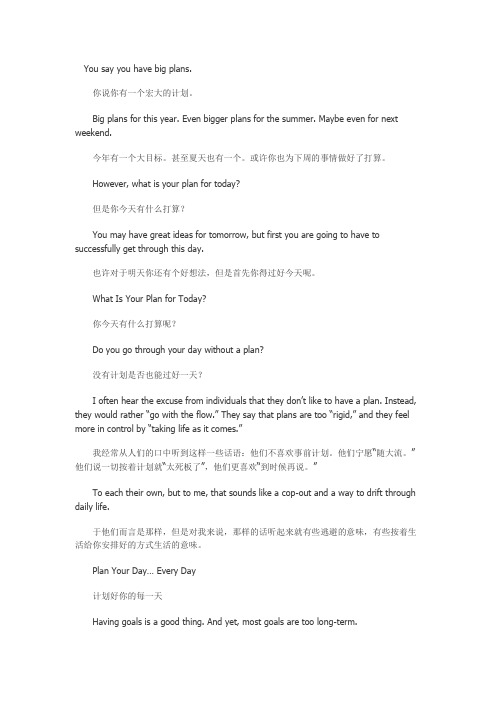
You say you have big plans.你说你有一个宏大的计划。
Big plans for this year. Even bigger plans for the summer. Maybe even for next weekend.今年有一个大目标。
甚至夏天也有一个。
或许你也为下周的事情做好了打算。
However, what is your plan for today?但是你今天有什么打算?You may have great ideas for tomorrow, but first you are going to have to successfully get through this day.也许对于明天你还有个好想法,但是首先你得过好今天呢。
What Is Your Plan for Today?你今天有什么打算呢?Do you go through your day without a plan?没有计划是否也能过好一天?I often hear the excuse from individuals that they don’t like to have a plan. Instead, they would rather “go with the flow.” They say that plans are too “rigid,” and they feel more in control by “taking life as it comes.”我经常从人们的口中听到这样一些话语:他们不喜欢事前计划。
他们宁愿“随大流。
”他们说一切按着计划就“太死板了”,他们更喜欢“到时候再说。
”To each their own, but to me, that sounds like a cop-out and a way to drift through daily life.于他们而言是那样,但是对我来说,那样的话听起来就有些逃避的意味,有些按着生活给你安排好的方式生活的意味。
王月芬 新课程有效作业设计方法和路径
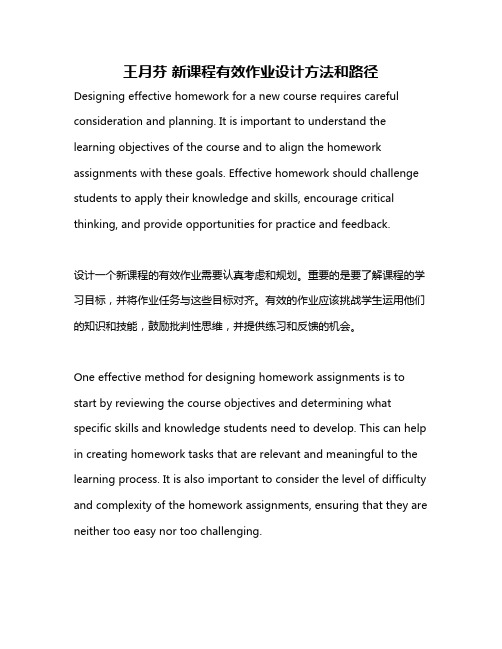
王月芬新课程有效作业设计方法和路径Designing effective homework for a new course requires careful consideration and planning. It is important to understand the learning objectives of the course and to align the homework assignments with these goals. Effective homework should challenge students to apply their knowledge and skills, encourage critical thinking, and provide opportunities for practice and feedback.设计一个新课程的有效作业需要认真考虑和规划。
重要的是要了解课程的学习目标,并将作业任务与这些目标对齐。
有效的作业应该挑战学生运用他们的知识和技能,鼓励批判性思维,并提供练习和反馈的机会。
One effective method for designing homework assignments is to start by reviewing the course objectives and determining what specific skills and knowledge students need to develop. This can help in creating homework tasks that are relevant and meaningful to the learning process. It is also important to consider the level of difficulty and complexity of the homework assignments, ensuring that they are neither too easy nor too challenging.设计作业任务的一个有效方法是首先回顾课程目标,确定学生需要发展的具体技能和知识。
时间规划梦想启航的英语作文
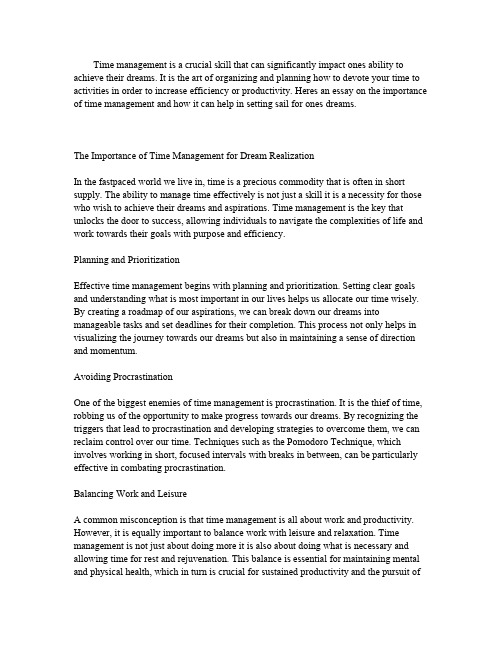
Time management is a crucial skill that can significantly impact ones ability to achieve their dreams.It is the art of organizing and planning how to devote your time to activities in order to increase efficiency or productivity.Heres an essay on the importance of time management and how it can help in setting sail for ones dreams.The Importance of Time Management for Dream RealizationIn the fastpaced world we live in,time is a precious commodity that is often in short supply.The ability to manage time effectively is not just a skill it is a necessity for those who wish to achieve their dreams and aspirations.Time management is the key that unlocks the door to success,allowing individuals to navigate the complexities of life and work towards their goals with purpose and efficiency.Planning and PrioritizationEffective time management begins with planning and prioritization.Setting clear goals and understanding what is most important in our lives helps us allocate our time wisely. By creating a roadmap of our aspirations,we can break down our dreams into manageable tasks and set deadlines for their completion.This process not only helps in visualizing the journey towards our dreams but also in maintaining a sense of direction and momentum.Avoiding ProcrastinationOne of the biggest enemies of time management is procrastination.It is the thief of time, robbing us of the opportunity to make progress towards our dreams.By recognizing the triggers that lead to procrastination and developing strategies to overcome them,we can reclaim control over our time.Techniques such as the Pomodoro Technique,which involves working in short,focused intervals with breaks in between,can be particularly effective in combating procrastination.Balancing Work and LeisureA common misconception is that time management is all about work and productivity. However,it is equally important to balance work with leisure and relaxation.Time management is not just about doing more it is also about doing what is necessary and allowing time for rest and rejuvenation.This balance is essential for maintaining mental and physical health,which in turn is crucial for sustained productivity and the pursuit ofour dreams.Adapting to ChangeLife is unpredictable,and our plans often need to adapt to changing circumstances. Effective time management involves being flexible and able to adjust our schedules and priorities as needed.This adaptability is a sign of resilience and is a key component of achieving longterm goals.Utilizing TechnologyIn todays digital age,technology can be a powerful ally in time management.There are numerous tools and apps available that can help us organize our tasks,set reminders,and track our progress.By leveraging these resources,we can streamline our efforts and ensure that we are making the most of every moment.Continuous ImprovementFinally,effective time management is a continuous process of improvement.It requires regular reflection on our habits and practices,identifying areas for improvement,and making necessary adjustments.This ongoing process of selfassessment and refinement is what ultimately leads to mastery over our time and,by extension,our lives.In conclusion,time management is an essential skill for anyone who wishes to set sail on the journey towards their dreams.By planning,prioritizing,avoiding procrastination, balancing work and leisure,adapting to change,utilizing technology,and continuously improving,we can navigate the challenges of life with confidence and purpose.With time management as our compass,we can steer our course towards the realization of our dreams.。
大学内部业务流程
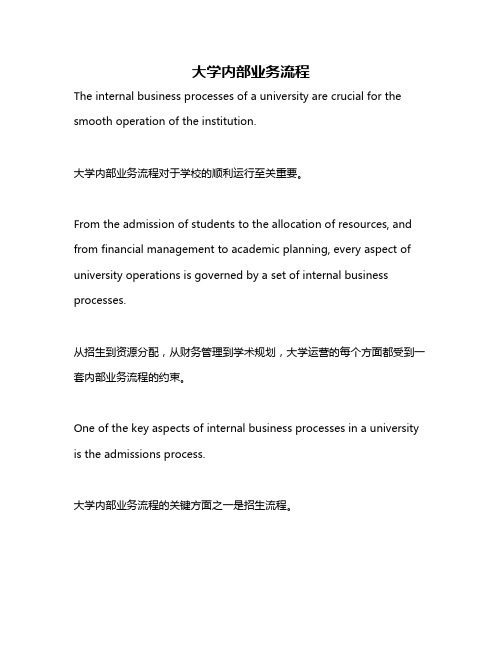
大学内部业务流程The internal business processes of a university are crucial for the smooth operation of the institution.大学内部业务流程对于学校的顺利运行至关重要。
From the admission of students to the allocation of resources, and from financial management to academic planning, every aspect of university operations is governed by a set of internal business processes.从招生到资源分配,从财务管理到学术规划,大学运营的每个方面都受到一套内部业务流程的约束。
One of the key aspects of internal business processes in a university is the admissions process.大学内部业务流程的关键方面之一是招生流程。
This process involves receiving and reviewing applications from prospective students, processing the applications, communicating admission decisions, and enrolling admitted students.该流程涉及接收和审核来自有意向的学生的申请,处理申请,沟通录取决定,并录取被录取的学生。
Efficient and effective internal business processes for admissions are essential for maintaining the quality and quantity of students in the university.高效、高效的招生内部业务流程对于维持大学的学生质量和数量至关重要。
英语作文计划与安排开头和结尾
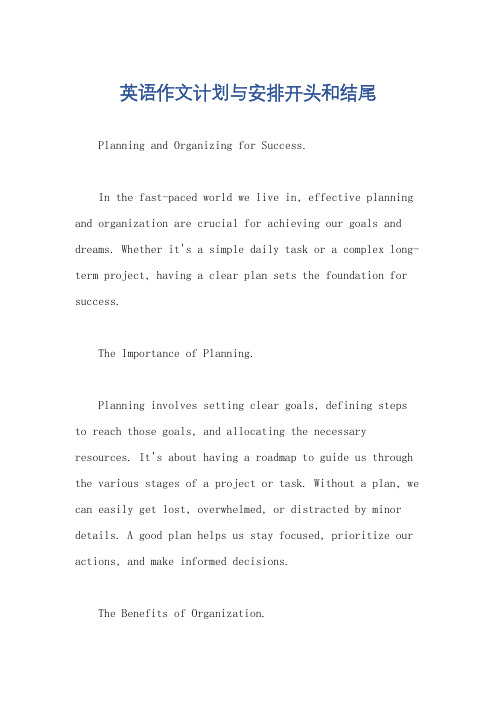
英语作文计划与安排开头和结尾Planning and Organizing for Success.In the fast-paced world we live in, effective planning and organization are crucial for achieving our goals and dreams. Whether it's a simple daily task or a complex long-term project, having a clear plan sets the foundation for success.The Importance of Planning.Planning involves setting clear goals, defining steps to reach those goals, and allocating the necessary resources. It's about having a roadmap to guide us through the various stages of a project or task. Without a plan, we can easily get lost, overwhelmed, or distracted by minor details. A good plan helps us stay focused, prioritize our actions, and make informed decisions.The Benefits of Organization.Organization, on the other hand, is the key to managing our time, resources, and information effectively. It's about creating systems and structures that enable us to work more efficiently and productively. When we are organized, we can find things quickly, avoid duplication of effort, and make the most of our available resources. Organization also helps us reduce stress and anxiety by giving us a sense of control and predictability in ourdaily lives.Strategies for Effective Planning and Organization.1. Goal Setting: Start by defining your overall objective. What do you want to achieve? What is your end goal? Make sure it's specific, measurable, achievable, relevant, and time-bound (SMART).2. Brainstorming and Outlining: Gather ideas and potential steps to reach your goal. Organize them into a logical order and create an outline or roadmap.3. Prioritizing: Determine which tasks are most important and which ones can be delegated or postponed. This helps you focus on what matters most.4. Scheduling: Block out time in your calendar for each task or project. Allocate enough time for each activity and plan for breaks to avoid burnout.5. Using Tools and Technology: Utilize tools like calendars, to-do lists, project management software, and digital organizers to help you stay organized and on track.6. Reviewing and Adjusting: Regularly review your plan and make adjustments as needed. Be flexible and willing to change course if necessary to stay aligned with your goals.Applying Planning and Organization to Different Aspects of Life.Planning and organization can be applied to various areas of our lives, including:Personal Life: Organizing your daily schedule, setting goals for personal growth, and managing your time effectively can help you lead a more balanced andfulfilling life.Academics: Planning out your study schedule, creating a to-do list for assignments, and organizing your notes can help you achieve better academic performance.Career: Setting career goals, creating a resume and cover letter, and managing your professional network can help you advance in your chosen field.Financial Planning: Developing a budget, saving for future goals, and investing wisely are all part ofeffective financial planning.Conclusion.In conclusion, planning and organization are invaluable skills that can transform our lives for the better. By setting clear goals, prioritizing our actions, and creatingsystems to manage our time and resources, we can achieve more, stress less, and enjoy a higher level of success and fulfillment. As we continue to grow and develop as individuals, it's important to remember that planning and organization are not static; they require ongoing attention and adjustment. By continuously evaluating our goals and strategies, we can stay agile and responsive to the changing demands of life.。
熟虑远谋拓新程的英语作文
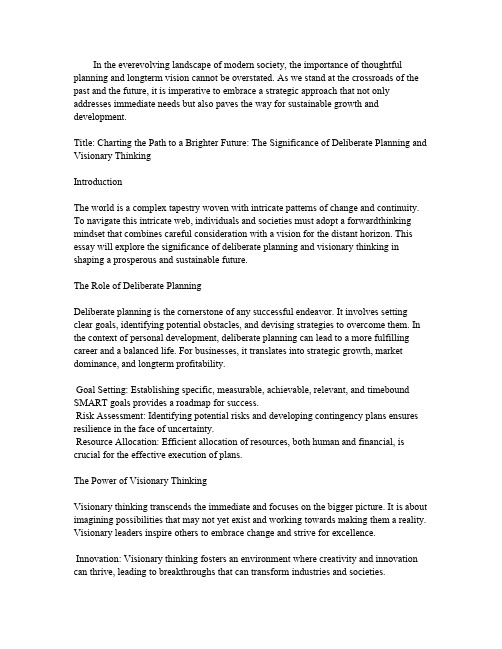
In the everevolving landscape of modern society,the importance of thoughtful planning and longterm vision cannot be overstated.As we stand at the crossroads of the past and the future,it is imperative to embrace a strategic approach that not only addresses immediate needs but also paves the way for sustainable growth and development.Title:Charting the Path to a Brighter Future:The Significance of Deliberate Planning and Visionary ThinkingIntroductionThe world is a complex tapestry woven with intricate patterns of change and continuity. To navigate this intricate web,individuals and societies must adopt a forwardthinking mindset that combines careful consideration with a vision for the distant horizon.This essay will explore the significance of deliberate planning and visionary thinking in shaping a prosperous and sustainable future.The Role of Deliberate PlanningDeliberate planning is the cornerstone of any successful endeavor.It involves setting clear goals,identifying potential obstacles,and devising strategies to overcome them.In the context of personal development,deliberate planning can lead to a more fulfilling career and a balanced life.For businesses,it translates into strategic growth,market dominance,and longterm profitability.Goal Setting:Establishing specific,measurable,achievable,relevant,and timebound SMART goals provides a roadmap for success.Risk Assessment:Identifying potential risks and developing contingency plans ensures resilience in the face of uncertainty.Resource Allocation:Efficient allocation of resources,both human and financial,is crucial for the effective execution of plans.The Power of Visionary ThinkingVisionary thinking transcends the immediate and focuses on the bigger picture.It is about imagining possibilities that may not yet exist and working towards making them a reality. Visionary leaders inspire others to embrace change and strive for excellence.Innovation:Visionary thinking fosters an environment where creativity and innovation can thrive,leading to breakthroughs that can transform industries and societies.Inspiration:A clear and compelling vision can motivate individuals to work towards a common goal,creating a sense of unity and purpose.Adaptability:Being able to envision different scenarios and prepare for them allows for greater adaptability in the face of change.Case Studies:Success StoriesThroughout history,there have been numerous examples of individuals and organizations that have successfully employed deliberate planning and visionary thinking to achieve remarkable outcomes.Steve Jobs and Apple:Jobs vision for userfriendly technology and his meticulous attention to design and functionality led to the creation of products that revolutionized the tech industry.Nelson Mandela:His longterm vision for a democratic and racially inclusive South Africa,coupled with strategic planning during his imprisonment,ultimately led to the dismantling of apartheid.Challenges and Overcoming ThemWhile the benefits of deliberate planning and visionary thinking are clear,implementing them is not without challenges.Resistance to change,shortterm thinking,and lack of resources can all hinder progress.However,by fostering a culture of innovation, encouraging openmindedness,and seeking partnerships,these challenges can be overcome.ConclusionIn conclusion,the synergy between deliberate planning and visionary thinking is a powerful force that can drive societies towards a more prosperous and sustainable future. By setting clear goals,embracing innovation,and inspiring collective action,we can navigate the complexities of our everchanging world and chart a course for success.It is through this lens that we must view our actions and decisions,ensuring that each step we take is in alignment with our longterm aspirations.。
高一选课规划作文英语
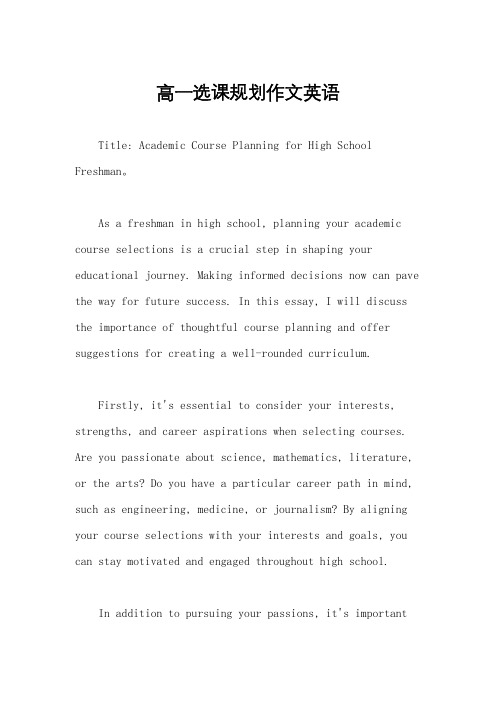
高一选课规划作文英语Title: Academic Course Planning for High School Freshman。
As a freshman in high school, planning your academic course selections is a crucial step in shaping your educational journey. Making informed decisions now can pave the way for future success. In this essay, I will discuss the importance of thoughtful course planning and offer suggestions for creating a well-rounded curriculum.Firstly, it's essential to consider your interests, strengths, and career aspirations when selecting courses. Are you passionate about science, mathematics, literature, or the arts? Do you have a particular career path in mind, such as engineering, medicine, or journalism? By aligning your course selections with your interests and goals, you can stay motivated and engaged throughout high school.In addition to pursuing your passions, it's importantto maintain a balanced course load. A well-rounded education encompasses various subjects, including English, mathematics, science, history, and foreign languages. Each discipline offers unique perspectives and skills that are valuable for personal and intellectual growth.English courses are fundamental for developing strong communication skills, both written and verbal. They also provide opportunities to explore literature and analyze complex texts, fostering critical thinking and creativity. Mathematics courses build problem-solving abilities and logical reasoning, skills that are applicable across various fields and professions.Science courses introduce students to the principles of biology, chemistry, and physics, cultivating an understanding of the natural world and scientific inquiry. History courses offer insights into past events and civilizations, fostering an appreciation for cultural diversity and historical context.Foreign language courses provide opportunities to learnabout different cultures and communicate with people from around the world. In an increasingly globalized society, proficiency in a second language can open doors to new opportunities and experiences.Beyond the core subjects, high school often offers elective courses in areas such as computer science, visual and performing arts, and physical education. These courses allow students to explore their interests further and develop skills that may not be covered in the core curriculum.When planning your course schedule, it's essential to consider both short-term and long-term goals. Think about the prerequisites for advanced courses and college admissions requirements. Taking challenging courses and performing well academically can enhance your college applications and scholarship opportunities.Furthermore, don't hesitate to seek guidance from teachers, counselors, and mentors. They can provide valuable insights and advice based on their experiences andexpertise. Additionally, consider talking to upperclassmen or alumni to learn from their experiences and gain perspective on course selections and extracurricular activities.In conclusion, academic course planning is a crucial aspect of high school freshman year. By choosing courses that align with your interests and goals, maintaining a balanced course load, and seeking guidance when needed, you can create a meaningful and rewarding educational experience. Remember that your course selections will shape your high school experience and lay the foundation for future endeavors.。
深思熟虑定新程的英语作文
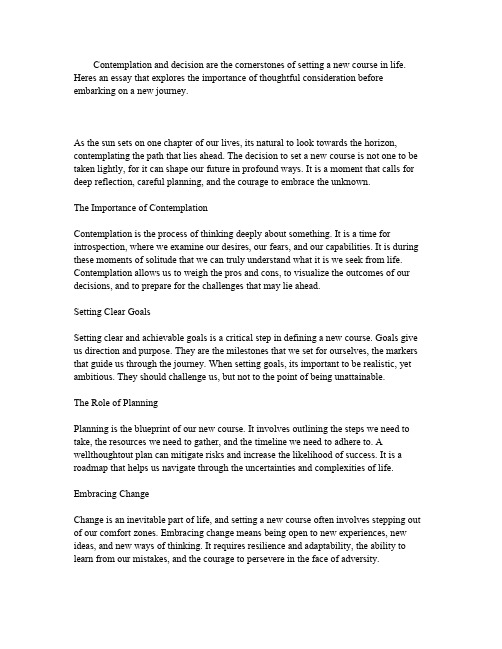
Contemplation and decision are the cornerstones of setting a new course in life. Heres an essay that explores the importance of thoughtful consideration before embarking on a new journey.As the sun sets on one chapter of our lives,its natural to look towards the horizon, contemplating the path that lies ahead.The decision to set a new course is not one to be taken lightly,for it can shape our future in profound ways.It is a moment that calls for deep reflection,careful planning,and the courage to embrace the unknown.The Importance of ContemplationContemplation is the process of thinking deeply about something.It is a time for introspection,where we examine our desires,our fears,and our capabilities.It is during these moments of solitude that we can truly understand what it is we seek from life. Contemplation allows us to weigh the pros and cons,to visualize the outcomes of our decisions,and to prepare for the challenges that may lie ahead.Setting Clear GoalsSetting clear and achievable goals is a critical step in defining a new course.Goals give us direction and purpose.They are the milestones that we set for ourselves,the markers that guide us through the journey.When setting goals,its important to be realistic,yet ambitious.They should challenge us,but not to the point of being unattainable.The Role of PlanningPlanning is the blueprint of our new course.It involves outlining the steps we need to take,the resources we need to gather,and the timeline we need to adhere to.A wellthoughtout plan can mitigate risks and increase the likelihood of success.It is a roadmap that helps us navigate through the uncertainties and complexities of life.Embracing ChangeChange is an inevitable part of life,and setting a new course often involves stepping out of our comfort zones.Embracing change means being open to new experiences,new ideas,and new ways of thinking.It requires resilience and adaptability,the ability to learn from our mistakes,and the courage to persevere in the face of adversity.The Power of SupportNo man is an island,and setting a new course is often made easier with the support of others.This could be the encouragement of a friend,the guidance of a mentor,or the camaraderie of a likeminded community.Support can provide us with the strength to overcome obstacles,the inspiration to keep going,and the reassurance that we are not alone in our journey.ConclusionSetting a new course in life is a significant decision that requires contemplation, goalsetting,planning,embracing change,and seeking support.It is a journey that is as much about personal growth as it is about achieving our dreams.By taking the time to thoughtfully consider our next steps,we can set ourselves on a path that leads to fulfillment and success.In the end,the journey of setting a new course is as much about the process as it is about the destination.It is a testament to our ability to dream,to aspire,and to take action towards a better future.As we embark on this new chapter,let us do so with a heart full of hope,a mind full of determination,and a spirit full of courage.。
高一选课规划作文英语
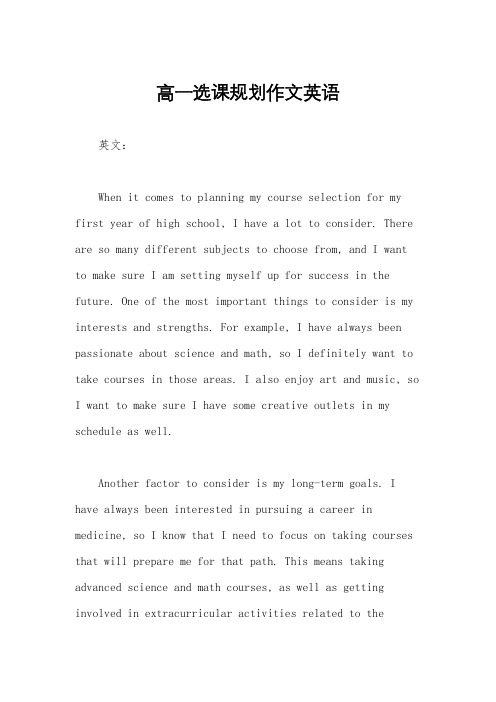
高一选课规划作文英语英文:When it comes to planning my course selection for my first year of high school, I have a lot to consider. There are so many different subjects to choose from, and I want to make sure I am setting myself up for success in the future. One of the most important things to consider is my interests and strengths. For example, I have always been passionate about science and math, so I definitely want to take courses in those areas. I also enjoy art and music, so I want to make sure I have some creative outlets in my schedule as well.Another factor to consider is my long-term goals. I have always been interested in pursuing a career in medicine, so I know that I need to focus on taking courses that will prepare me for that path. This means taking advanced science and math courses, as well as getting involved in extracurricular activities related to themedical field. I also want to make sure I am well-rounded, so I plan on taking courses in history and literature to broaden my knowledge and perspective.In addition to my interests and goals, I also need to consider the requirements for graduation and college admissions. I know that I need to fulfill certain credit requirements in subjects like English, history, and foreign language. I also need to make sure I am taking challenging courses to show colleges that I am capable of handling rigorous academics. This means taking honors and AP courses when possible.Overall, my course selection will be a balance of my interests, long-term goals, and graduation requirements. I want to challenge myself academically while also exploring my passions and preparing for my future.中文:在规划我高中一年级的选课时,我需要考虑很多因素。
表示 计划 单词 英语
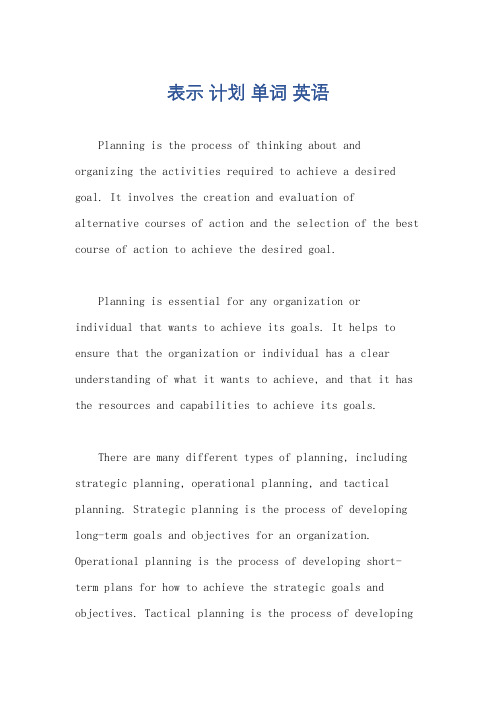
表示计划单词英语Planning is the process of thinking about and organizing the activities required to achieve a desired goal. It involves the creation and evaluation ofalternative courses of action and the selection of the best course of action to achieve the desired goal.Planning is essential for any organization orindividual that wants to achieve its goals. It helps to ensure that the organization or individual has a clear understanding of what it wants to achieve, and that it has the resources and capabilities to achieve its goals.There are many different types of planning, including strategic planning, operational planning, and tactical planning. Strategic planning is the process of developing long-term goals and objectives for an organization. Operational planning is the process of developing short-term plans for how to achieve the strategic goals and objectives. Tactical planning is the process of developingdetailed plans for how to achieve the operational plans.The planning process typically involves the following steps:1. Identify the goal. The first step in planning is to identify the goal that you want to achieve. This goal should be specific, measurable, achievable, relevant, and time-bound.2. Gather information. Once you have identified your goal, you need to gather information about the current situation and the potential obstacles that you may face. This information can be gathered through research, interviews, and observation.3. Develop alternative courses of action. Once you have gathered information, you need to develop alternative courses of action for achieving your goal. These courses of action should be evaluated in terms of their feasibility, cost, and potential benefits.4. Select the best course of action. Once you have evaluated the alternative courses of action, you need to select the best course of action. This decision should be based on the criteria that you have established.5. Implement the plan. Once you have selected the best course of action, you need to implement the plan. This involves taking the necessary steps to achieve your goal.6. Monitor and evaluate the plan. Once you have implemented the plan, you need to monitor and evaluate the plan to ensure that it is achieving the desired results. If the plan is not achieving the desired results, you may need to make adjustments to the plan.Planning is an ongoing process that should be revisited regularly. As the situation changes, you may need to adjust your plans to ensure that you are still on track to achieve your goals.Benefits of Planning.There are many benefits to planning, including:Improved decision-making. Planning helps you to make better decisions by providing you with a clear understanding of your goals and objectives.Increased efficiency. Planning helps you to use your resources more efficiently by identifying the most effective way to achieve your goals.Reduced risk. Planning helps you to identify and mitigate potential risks that could derail your plans.Increased motivation. Planning helps to motivate you and your team by providing a clear path to achieving your goals.Improved communication. Planning helps to improve communication by providing a shared understanding of the goals and objectives of the organization or individual.Tips for Effective Planning.Here are a few tips for effective planning:Start with a clear goal. The first step in planning is to identify the goal that you want to achieve. This goal should be specific, measurable, achievable, relevant, and time-bound.Gather information. Once you have identified your goal, you need to gather information about the current situation and the potential obstacles that you may face. This information can be gathered through research, interviews, and observation.Develop alternative courses of action. Once you have gathered information, you need to develop alternative courses of action for achieving your goal. These courses of action should be evaluated in terms of their feasibility, cost, and potential benefits.Select the best course of action. Once you have evaluated the alternative courses of action, you need toselect the best course of action. This decision should be based on the criteria that you have established.Implement the plan. Once you have selected the best course of action, you need to implement the plan. This involves taking the necessary steps to achieve your goal.Monitor and evaluate the plan. Once you have implemented the plan, you need to monitor and evaluate the plan to ensure that it is achieving the desired results. If the plan is not achieving the desired results, you may need to make adjustments to the plan.Planning is an essential part of any successful organization or individual. By following these tips, you can improve your planning process and achieve your goals more effectively.。
课程计划的概念和定义
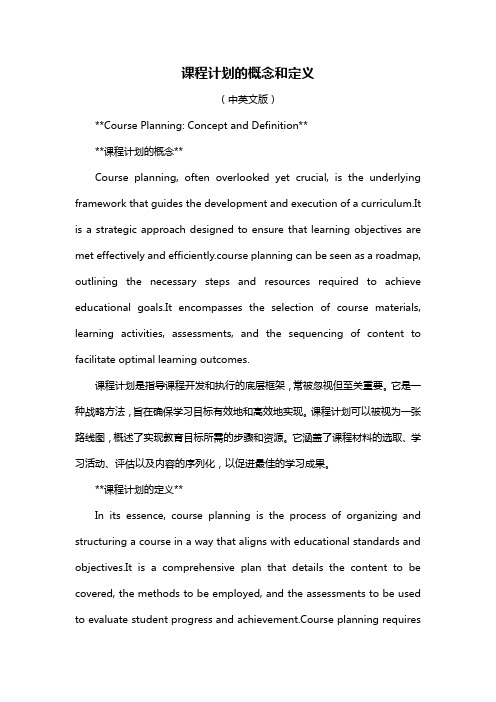
课程计划的概念和定义(中英文版)**Course Planning: Concept and Definition****课程计划的概念**Course planning, often overlooked yet crucial, is the underlying framework that guides the development and execution of a curriculum.It is a strategic approach designed to ensure that learning objectives are met effectively and efficiently.course planning can be seen as a roadmap, outlining the necessary steps and resources required to achieve educational goals.It encompasses the selection of course materials, learning activities, assessments, and the sequencing of content to facilitate optimal learning outcomes.课程计划是指导课程开发和执行的底层框架,常被忽视但至关重要。
它是一种战略方法,旨在确保学习目标有效地和高效地实现。
课程计划可以被视为一张路线图,概述了实现教育目标所需的步骤和资源。
它涵盖了课程材料的选取、学习活动、评估以及内容的序列化,以促进最佳的学习成果。
**课程计划的定义**In its essence, course planning is the process of organizing and structuring a course in a way that aligns with educational standards and objectives.It is a comprehensive plan that details the content to be covered, the methods to be employed, and the assessments to be used to evaluate student progress and achievement.Course planning requirescareful consideration of learner needs, educational goals, and the context in which the course will be delivered.It is an ongoing process that may require adjustments and revisions based on feedback, student performance, and changing educational priorities.本质上,课程计划是一个以符合教育标准和目标的方式组织和结构化课程的过程。
课程安排英语作文
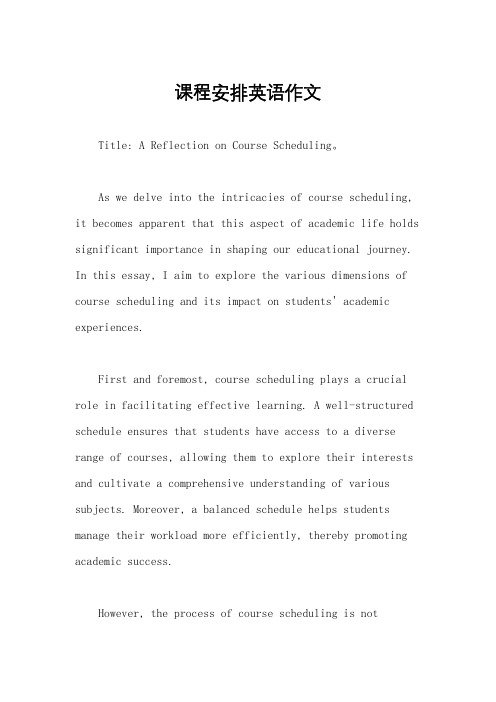
课程安排英语作文Title: A Reflection on Course Scheduling。
As we delve into the intricacies of course scheduling, it becomes apparent that this aspect of academic life holds significant importance in shaping our educational journey. In this essay, I aim to explore the various dimensions of course scheduling and its impact on students' academic experiences.First and foremost, course scheduling plays a crucial role in facilitating effective learning. A well-structured schedule ensures that students have access to a diverse range of courses, allowing them to explore their interests and cultivate a comprehensive understanding of various subjects. Moreover, a balanced schedule helps students manage their workload more efficiently, thereby promoting academic success.However, the process of course scheduling is notwithout its challenges. One common issue that studentsoften encounter is the difficulty of securing seats inhigh-demand courses. This can lead to frustration andhinder students' ability to pursue their academic interests. Furthermore, scheduling conflicts may arise, making it challenging for students to enroll in the courses theydesire without compromising their other commitments.To address these challenges, educational institutions must adopt strategies to optimize course scheduling. One approach is to utilize technology to streamline the scheduling process and provide students with real-time updates on course availability. Additionally, institutions can offer more flexible scheduling options, such as online courses or evening classes, to accommodate the diverseneeds of students.Furthermore, collaboration between students and academic advisors is essential in creating a courseschedule that aligns with students' academic goals and interests. By engaging in open communication and proactive planning, students can make informed decisions about theircourse selections and avoid potential scheduling conflicts.In addition to facilitating academic success, course scheduling also plays a significant role in fostering a sense of community and belonging among students. Shared courses and common schedules provide opportunities for students to connect with their peers, collaborate on projects, and engage in meaningful discussions. Moreover, extracurricular activities and campus events can be integrated into course schedules to enrich students'overall college experience.In conclusion, course scheduling is a multifaceted aspect of academic life that requires careful consideration and planning. By optimizing course schedules, educational institutions can enhance students' learning experiences, promote academic success, and foster a sense of community. Through effective collaboration and strategic planning, we can create course schedules that empower students to achieve their academic goals and thrive in their educational journey.。
- 1、下载文档前请自行甄别文档内容的完整性,平台不提供额外的编辑、内容补充、找答案等附加服务。
- 2、"仅部分预览"的文档,不可在线预览部分如存在完整性等问题,可反馈申请退款(可完整预览的文档不适用该条件!)。
- 3、如文档侵犯您的权益,请联系客服反馈,我们会尽快为您处理(人工客服工作时间:9:00-18:30)。
Planning & Courses
Overview of planning and courses for Engineering Sciences (including suggested schedules)
Our broad-based, multidisciplinary curriculum (including an ABET-accredited S.B. degree) rivals the more traditional engineering and applied science programs at larger institutions, and offers rigorous preparation for graduate school (including medicine) or for industry.
Our flexible structure encourages students to make the most of Harvard’s resources, such as taking courses in other departments, collaborating with researchers from other fields or schools, and taking advantage of the wealth of extracurricular activities available.
Placement
Placement is granted based on an appropriate Advanced Placement Examination, the Harvard Mathematics Placement Test, or an equivalent college-level course taken elsewhere. Questions regarding placement should be forwarded to the Director of Undergraduate Studies.
Students should consult with the Mathematics Department, Chemistry Department, and Physics Department for advice about appropriate placement in courses.
Tracks in Engineering
Two different Engineering Sciences degrees are offered at Harvard: the Bachelor of Arts (A.B.) and the Bachelor of Science (S.B.), in five distinct areas:
∙Biomedical Sciences and Engineering
∙Electrical Engineering and Computer Science
∙Engineering Physics (A.B. only)
∙Environmental Sciences and Engineering; Mechanical and Materials Sciences and Engineering.
Degree Programs
Bachelor of Arts
The A.B. degree requires 14–16 half-courses.
Attendance at the Sophomore Forum is required for A.B. students
Bachelor of Science
The S.B. degree requires 20 half-courses.
Attendance at the Sophomore Forum is required for S.B. students.
English Honors
The Committee on Undergraduate Studies in Engineering Sciences votes the level of English honors to be recommended (Honors, High Honors, Highest Honors).
Recommendations for all degrees of honors are decided individually by vote of the Engineering Sciences faculty based on the student's academic and scientific achievements. Ordinarily a recommendation Highest Honors requires a concentration GPA of in the top 5% of the concentration and an outstanding thesis, a recommendation of high honors requires a concentration GPA in the next 20% and an excellent thesis and a recommendation of honors requires a concentration GPA in the next 25% and a thesis.
A.B./S.M. Option
Students with sufficient advanced placement credit to qualify for advanced standing may graduate with a bachelor’s and master’s degree in four years.。
